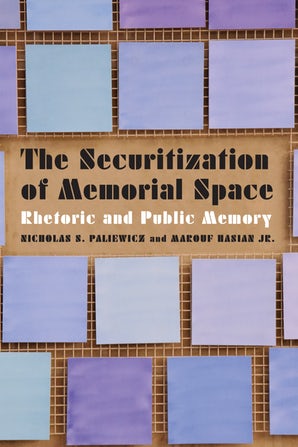
N. S. Paliewicz, M. Hasian Jr., The Securitization of Memorial Space. Rhetoric and Public Memory
N. S. Paliewicz, M. Hasian Jr.
The Securitization of Memorial Space. Rhetoric and Public Memory
University of Nebraska Press
312 p.
50,00 $
ISBN 978-1-4962-1555-0
PRESENTATION
The Securitization of Memorial Space argues that the National September 11 Memorial and Memorial Museum is a securitized site of memory—what Foucault called a dispositif—that polices visitors and publics to remember trauma, darkness, and victimage in ways that perpetuate the “necessity” of the Global War on Terrorism.
Contributing to studies in public memory, rhetoric and argumentation, and critical security studies, Nicholas S. Paliewicz and Marouf Hasian Jr. show how various human and nonhuman actors participated in complicated argumentative formations that have mobilized political, performative, and militaristic practices of anti-terroristic violence in other parts of the world. While there were times that certain argumentative stakeholders—such as local New Yorkers—questioned the necessity of securitizing this site of memory, agentic factions including the families of those who died on 9/11, public supporters, security agents, and politicians created an ideologically oriented security assemblage that remembers 9/11 through counter-terroristic performances at Ground Zero.
In chronological order from the 2001 “dustbowl” to the present popularization of 9/11 memories, the authors present seven chapters of rich rhetorical analysis that show how the National September 11 Memorial and Memorial Museum perpetuates grief, uncertainty, and angst that affects public memory in multidirectional ways.
SOMMAIRE
Introduction: Remembering 9/11 (In)Securities and the Impetus for National Commemoration at Ground Zero
1. The Ambiguities and Insecurities of Ground Zero Space: How Dust and Shrines Threatened the Resecuritization of New York
2. Rebuilding Ground Zero: Risky Objects and the Force of Security, 2002–2005
3. Policing Memory with Moral Authority: The Idealistic Visions of Family Members of the Deceased, 2004–2014
4. Melancholic Commemoration and “Policing” at the National September 11 Memorial, 2011–2014
5. Holocaust Memories and Counterterrorist Practices at Ground Zero
Conclusion: How the National September 11 Memorial and Memorial Museum Functions as a Political Platform for Legitimating Future U.S. Interventionism
AUTHORS BIO
Nicholas S. Paliewicz is an assistant professor in the Department of Communication at the University of Louisville. Marouf Hasian Jr. is a professor in the Department of Communication at the University of Utah. He is the author of eleven books, including In the Name of Necessity: Military Tribunals and the Loss of American Civil Liberties and Colonial Legacies in Postcolonial Contexts: A Critical Rhetorical Examination of Legal Histories.